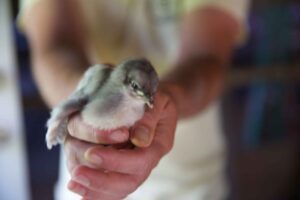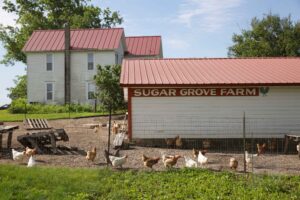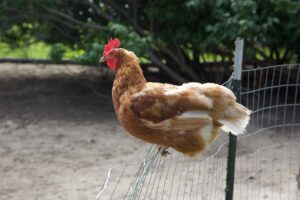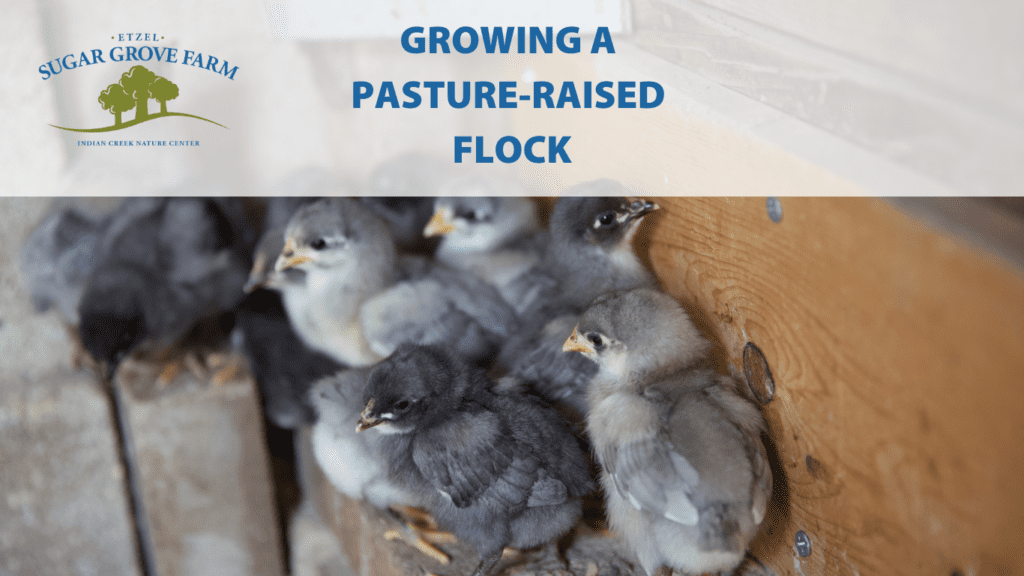The Flock is growing at Etzel Sugar Grove Farm!

![]() Less than two weeks ago a brood of 60 sapphire gem chicks arrived at the Etzel Sugar Grove Farm. These chicks, donated by Hoover’s Hatchery, are a welcome addition to the pasture-raised flock which included around 90 hens before these fuzzy additions started filling the chicken house with their peeps.
Less than two weeks ago a brood of 60 sapphire gem chicks arrived at the Etzel Sugar Grove Farm. These chicks, donated by Hoover’s Hatchery, are a welcome addition to the pasture-raised flock which included around 90 hens before these fuzzy additions started filling the chicken house with their peeps.
Introducing new chickens to the flock must always be done with care. For the first three or four weeks, the chicks are kept in their own corner of the chicken house. This allows them to grow without having to compete with the full-grown hens for food and water. Once the chicks are larger they will begin mingling with the older chickens. After they are four to six months old they’ll begin laying brown eggs and adding to the growing numbers of eggs laid by the entire flock.
The full-grown hens are already great egg layers and friendly with people — often following visitors around when they approach the chicken house. A few of the oldest hens are approaching the end of their egg-laying days, and will be donated to the Rodale Institute, who will use the old hens for their research into regenerative agriculture practices.
What does pasture-raised mean?

The term “pasture-raised” may sound similar to “cage-free” or “free-range” but there are real differences that impact the happiness and health of the hens (and potentially those who eat their meat and eggs).
“Pasture-raised” refers to chickens who have a large area outside where they can roam all year long. As a result of having so much access to the outdoors, the pasture-raised chickens have a more varied (and natural) diet that includes bugs and grass along with the feed provided to them.
Using the term “cage-free” only requires that a chicken has an open area, even if this “open area” is indoors. There is no requirement that chickens spend time outdoors for their eggs to be labeled cage-free. Living indoors in close quarters limits their diet and can lead to worse health conditions.
Labeling a chicken “free-range” can be misleading since there’s not a clear definition on what it means in practice. Free-range could mean that the chicken lives outdoors and enjoys a varied diet, or it could only mean they have some level of access to the outdoors and fresh grass. This could be as limited as having a hole big enough to stick their head through in order to reach outdoor grass.
There is still limited research on the nutritional differences between chickens raised according to different methods, but it doesn’t take a big leap of faith to imagine that access to the outdoors and a varied diet could create healthier and happier chickens.
Where to get Indian Creek Nature Center eggs
 Indian Creek Nature Center eggs can be purchased at the Creekside Shop inside Amazing Space, as well as businesses around town that share our appreciation for pasture-raised, locally-sourced food. Small, local businesses that either sell Indian Creek Nature Center eggs or use them in their food include Roasters Coffee House, Aroma Artisan Pizza, Lori Ann’s Candies, Frontier Co-op, Scout of Marion, Lion Bridge Brewing Company and Julia’s Kitchen.
Indian Creek Nature Center eggs can be purchased at the Creekside Shop inside Amazing Space, as well as businesses around town that share our appreciation for pasture-raised, locally-sourced food. Small, local businesses that either sell Indian Creek Nature Center eggs or use them in their food include Roasters Coffee House, Aroma Artisan Pizza, Lori Ann’s Candies, Frontier Co-op, Scout of Marion, Lion Bridge Brewing Company and Julia’s Kitchen.
And with the 60 adorable additions to the flock at Etzel Sugar Grove Farm, there will soon be even more chances for you to grab a dozen (or two) of Indian Creek Nature Center eggs.

